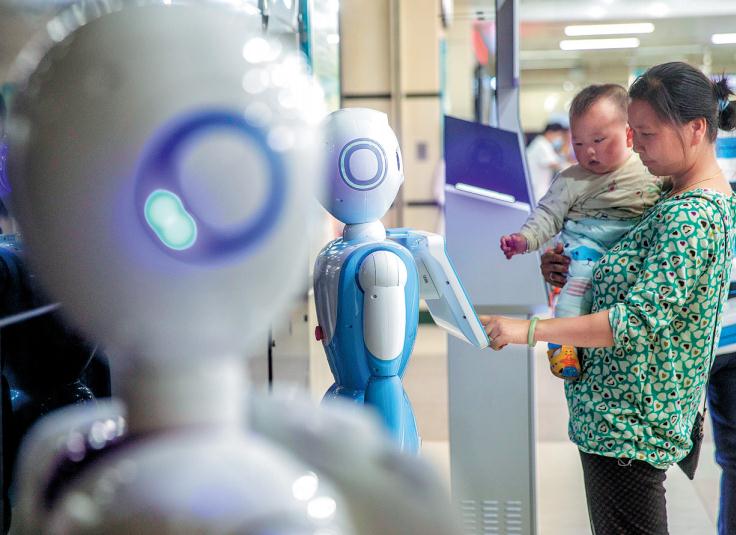AI just what doctor ordered


Artificial intelligence improves efficiency of case analysis, reduces problems in diagnosis
It is no surprise that patients often can't understand doctors' handwritten notes or prescriptions. But now, with artificial intelligence technology, doctors can simply dictate information, as their voices can be recognized automatically and converted into electronic medical records.
In addition, AI robots can help doctors analyze CT scans and improve the accuracy of early-stage cancer diagnosis-leveraging visual computation technology, big data analysis and intelligent algorithms-and even put forward a therapeutic regimen.
AI is poised to revolutionize the healthcare sector, starting from the draft of treatment plans through the assistance in repetitive jobs to medication management and drug development.
According to consulting firm Frost & Sullivan, global revenue from the AI-related healthcare industry will rise to $6.7 billion by 2021, up from $811 million in 2015. It is noteworthy that Chinese technology companies are aggressively moving into the field.
Working with several Chinese hospitals and medical institutions, iFlytek Co Ltd, a leading AI company, is using its expertise in speech technology to assist doctors in improving accuracy levels of diagnosis by launching an intelligent robot.
The robot can not only provide basic medical consultation services for patients, but also record their symptoms, analyze CT scans and make a diagnosis.
"The diagnosis accuracy rate for tuberculosis by our AI-enabled robot is 94.9 percent, while the rate by human beings is just about 70 percent," said Du Lan, vice-president of the company based in Hefei, Anhui province.
Moreover, Wanliyun Medical Information Technology, a medical imaging company, has developed a cloud platform through cooperation with Alibaba Health, the subsidiary of Alibaba Group Holding Ltd.
Around 90 percent of the medical data comes from the medical imaging sector.
"The platform provides remote medical image diagnosis and related services including X-rays, CT scans and magnetic resonance imaging for patients, physicians and hospitals," said Yan Ziye, the lead researcher at Wanliyun.
AI technologies could be used in this field to improve diagnosis accuracy and help doctors improve their time efficiency, he added.
China will promote the application of AI technology in the healthcare sector to improve services for patients, especially at the grassroots level, according to the National Health Commission.
Global tech behemoths are also putting together AI programs for the healthcare field. IBM has announced that its Watson supercomputer will be used in evaluating cancer treatment options for physicians, driving the decision-making process down to a matter of seconds. It has been offered to cancer treatment centers in the United States.
The AI research branch of search giant Google Inc has launched its Google Deepmind Health project, which is used to mine the data of medical records to provide better and faster health services.
Industry insiders said relying on powerful image and voice recognition and deep learning technology, AI will greatly improve the efficiency of data analysis and reduce pressure on doctors, as well as raise the accuracy of diagnosis and treatment.
"AI technology is being used in five areas, including healthcare robots, R&D of drugs, intelligent diagnosis and treatment, medical imaging and health management," said Liu Jiehao, an analyst from iiMedia Research, a market consultancy, adding that he is bullish on the prospects.
"The biggest advantage of AI lies in its highly-efficient calculation and precise analysis and decision-making, which could greatly improve working efficiency, unleash productivity as well as ease the shortage of medical resources and high cost in the healthcare industry," Liu said.
There are some potential safety hazards considering the uniqueness of individual patients and the diversity of diseases, he added.
Doctors should come up with a highly customized therapeutic scheme for every patient. But AI technology could still help, even if solely used in the diagnosis and treatment of certain kinds of diseases.
"Inappropriate treatment methods could endanger the lives of patients," Liu said.
However, the biggest barrier for the development of intelligent healthcare is to obtain a large amount of medical data, which involves the privacy of patients. Thus, cooperation with hospitals to obtain more trust is needed.




































